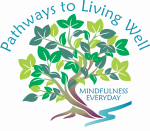
The Mindful Edge: Stress Management and Life Strategies for Teens and Young Adults Teacher Training Program

The Mindful Edge® is a specially developed program to provide Stress Reduction and Life Strategies for Teens. It is based on the principles of the MBSR Workshop program created by Jon Kabat-Zinn. The Mindful Edge™ combines the practices of mindfulness with knowledge of brain science, positive psychology, movement and healthy living skills to create a program that benefits teens socially, emotionally, physically and academically.
Students actively participate in the process of unfolding a practical understanding of mindfulness and how it can benefit them in their lives.
Course Structure
The program is composed of 1.5-hour themed lessons, in 3 units, delivered either in small groups, both in person or online. The Overall Program Goal – Resilience: Skill for being with the ups and downs in life
Core Lessons Unit 1 – The Essentials
Physiology of stress and how mindfulness can ease and help manage students’ response to stress.
Intro to mindfulness and relevance for students, establishing personal connection – the buy-in.
Experience of mindful practices that use body and breath as an anchor to attention: body scan, circle breathing, mindful eating.
The neuroscience of attention and neuroplasticity.
Going forward, reviewing how participants can implement mindfulness practice into daily life.
Core Lessons Unit 2 – SEL (Social and Emotional Learning)
Exploring thinking, including the impacts of perception, implicit bias, cognitive distortions. Cultivating mindful self-compassion as a means to manage negative self-talk.
What is Social and Emotional Intelligence? Exploring emotional literacy, moods, feelings and the continuum of emotions.
We can learn to manage strong emotions in a way that helps us identify our needs and get them met in situations, and does not escalate them.
Happiness is a state that can be cultivated through practicing gratitude, appreciation & kindness, drawing on the recent research on Positive Psychology.
Going forward, reviewing how participants can practice healthy mental and physical habits, self-awareness, emotion regulation and connection.
Core Lessons Unit 3 – Mindful Leadership
Investigating the aspects of mindfulness that support leadership: awareness, attention, intention and action.
Relationships and connection can be enhanced through practicing mindful speaking and listening. Principles of mindful communication include setting an intention, being fully present, remaining open and non-judgmental, and relating to others with compassion.
Exploring mindful art-based activities.
Putting It All Together. Going forward, reviewing how participants can implement mindfulness practices with their peers.
Suggested Reading List
- Mindful Teaching and Teaching Mindfulness: A Guide for Anyone Who Teaches Anything, Deborah Schoeberlein
- Mindfulness for Teachers: Simple Skills for Peace and Productivity in the Classroom, Patricia A. Jennings
- The Trauma-Sensitive Classroom: Building Resilience with Compassionate Teaching, Patricia A. Jennings
- The Mindful Teen: Powerful Skills To Help You Handle Stress One Moment At A Time, Dzung X Vo, MD, FAAP
- The Stress Reduction Workbook for Teens: Mindfulness Skills to Help You Deal with Stress, Gina M. Biegel MA LMFT
- Be Mindful & Stress Less 50 ways to deal with your (crazy) Life, Gina Biegel
- Take in the Good: Skills for Staying Positive and Living Your Best Life, Gina Biegel (Author), Breanna Chambers (Illustrator)
- Brainstorm: The Power & Purpose of the Teenage Brain, Daniel J. Siegel MD

